Healthy dog joints
How can I tell if my dog has joint pain?
 Dogs with joint pain avoid movement
Dogs with joint pain avoid movement
A summary of the signs of joint pain in dogs:
The dog:
- limps or starts walking differently
- may even resist walking at all, or not as far
- prefers softer sleeping places than previously
- has problems lying down and/or standing up
- doesn’t want to play any more
- reacts aggressively to lively or boisterous dogs, even if they are familiar and previously well-liked
- no longer wants to be touched or stroked everywhere
- reacts aggressively if touched in the painful area
- adopts a different body position when urinating or defecating
Preventing joint disease in dogs: what is good for joints and bones?
Many dog owners want to know what preventative action they can take to promote healthy bones and joints in their dog. This question comes up most frequently when dogs are still young and the focus is on healthy puppy growth. Healthy growth is particularly vital for larger breeds of dog that grow quickly in a short period, such as mastiffs or Saint Bernards. A very important foundation, of course, is the dog’s genetics. If the dog has congenital defects or joints that have failed to develop correctly, there is a much greater risk of joint disease. Finding a reputable breeder is a key issue here. But an important role is also played by factors that can be influenced by dog owners, such as incorrect nutrition, insufficient physical activity or overload, and excess weight.
 Healthy joints are the basis for mobility in dogs
Healthy joints are the basis for mobility in dogs
The right diet to support your dog’s joints
Activity to strengthen your dog’s musculoskeletal system
Weight control to prevent joint problems in dogs
Excess weight puts a strain on the joints, which significantly increases the risk of joint disease such as arthritis in dogs. That is why regular exercise is also important for a dog to maintain an ideal weight and thus avoid potential joint problems associated with obesity. If your dog is already susceptible to joint problems, daily exercise to control its weight is particularly important. You should be aware that every excess gram of weight puts an unnecessary additional strain on your pet’s joints. Swimming can be a great option here to strengthen your dog’s muscles and lose weight without putting a strain on the joints. To check whether your dog is at the desired weight or potentially overweight, you can consult our advice article on “BMI in dogs”.
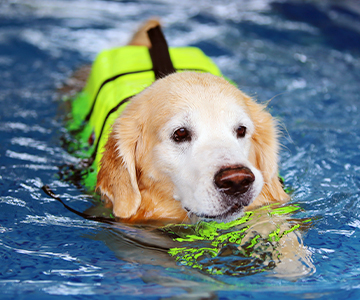 Swimming for joint-friendly weight reduction
Swimming for joint-friendly weight reduction
What is osteoarthritis and how does it arise in dogs?
Osteoarthritis is a progressive and degenerative joint disease in which there is either a breakdown of cartilage in the joint and/or the development of inflammation. This abrasion impairs joint function and causes joint pain. The problem occurs as soon as there is no longer sufficient cartilage. The outer bone membrane (periosteum) then rubs together, which is extremely painful for the dog and triggers additional inflammation processes. Each inflammation process in the joint impairs the ability of the synovial fluid to lubricate the joint, which then results in restricted movement. Joint degeneration or arthritis in dogs can either progress gradually or in stages. Unfortunately, the changes in the joints are permanent. Surgical interventions can be used to remove or smooth away cell debris or other build-up in the joint, however this cannot reverse the process of osteoarthritis in the dog.
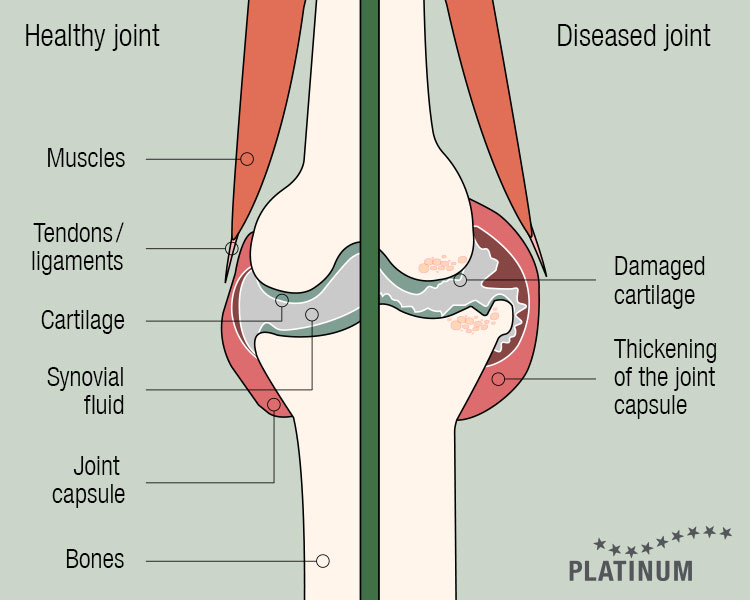
Causes of osteoarthritis in dogs:
- Persistent incorrect strain (e.g. due to misalignment, canine elbow or hip dysplasia)
- Overuse
- Excess weight
- Injury to the joint (e.g. fracture, cruciate ligament tear, open wound)
- Inflammation or infection in the joint (e.g. through injury or generalised infection, including Lyme disease)
The difference between arthritis and osteoarthritis (or arthrosis) in dogs
How can I find out whether my dog has osteoarthritis?
What can help if my dog has osteoarthritis?
Natural substances such as glycosaminoglycans and chondroitin can be used not only as a prophylaxis but also to treat osteoarthritis in dogs. They stimulate the joint metabolism and improve the synovial fluid. This acts as a joint lubricant and reduces friction between the articular cartilage, which can then reduce or prevent pain. In addition to natural ingredients to support joint health, such as green-lipped mussel extract, Fit-Bits Mobility also contains glycosaminoglycans and chondroitin. Fit-Bits are snacks with additional benefits that can either be used as snacks between meals or as a reward for your dog.
Anti-inflammatory substances such as MSM, rosehip and devil’s claw have a slight anti-inflammatory effect and thus can contribute to pain reduction. If these substances are not sufficient or cannot be tolerated by the dog, we recommend consulting your vet about administering additional active substances or medication.
There is even an obligation under animal welfare legislation for every pet owner to ensure they obtain treatment in case of pain or illness. Even if your dog has advanced osteoarthritis and the wear and tear cannot be reversed, the dog can be helped by getting appropriate treatment. Physical therapies such as osteopathy, chiropractic and physiotherapy can help avoid muscle tension etc. Pain reduction can also be achieved in combination with acupuncture. These treatments should be accompanied by an appropriate diet given the dog’s activity levels to avoid excess weight while still ensuring a supply of vital nutrients. Physical therapy, for example with an aquatrainer or treadmill, can support the muscular system and thus help the dog’s affected joints. Depending on which joint is affected and the dog’s age and weight, a joint replacement might be considered as a last resort.
In an ideal scenario, it is best to take preventative action by paying attention to the aforementioned nutritional factors, exercise and weight in a bid to avoid joint disease in your dog.
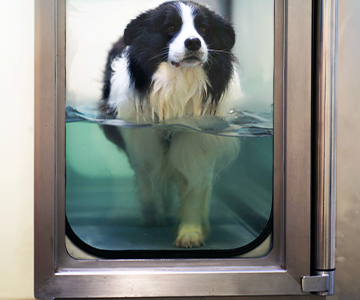 Aquatraining as part of physiotherapy for dogs
Aquatraining as part of physiotherapy for dogs
Canine hip dysplasia (HD) and elbow dysplasia (ED)
Product recommendations
The benefits of PLATINUM dog food
- PLATINUM uses a unique preparation method called FSG, which offers numerous advantages compared to conventional dog food.
- Dog food prepared with FSG is gently cooked only in its own meat juice and is therefore nutrient-rich like BARF, excellent for building muscles and also extra tasty for your dog.
- With at least 70% fresh meat in the dry dog food and 83% fresh meat or fresh fish in the wet dog food, PLATINUM places great value on a composition of the food that is adapted to the needs of dogs.
- The declaration and composition of dog food prepared with FSG is tested regularly and independently by ELAB Analytik GmbH (formerly TÜV SÜD ELAB) - for canine health protection.
- PLATINUM is generally very well accepted by dogs of all breeds and ages. Even four-legged friends with sensitive digestion or intolerances usually tolerate PLATINUM dog food well.
- All products are free of soya, GMOs and gluten. In addition, no flavour enhancers, attractants, odourants or colourings are used.
- Over 2,000 positive customer reviews at Trusted Shops speak for themselves!



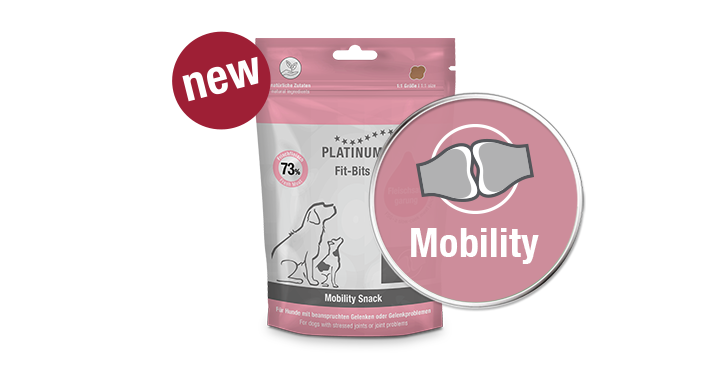
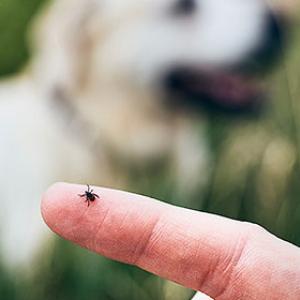



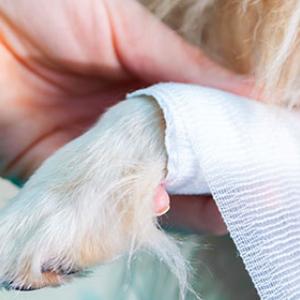

.png)
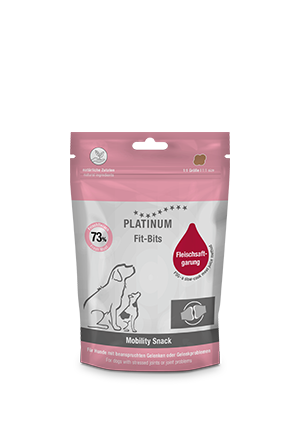
.png)
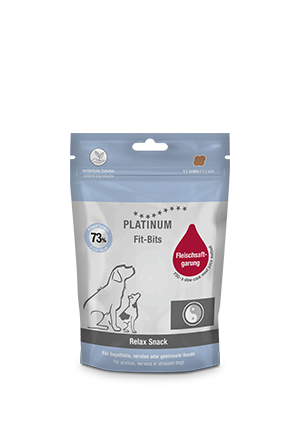
.png)